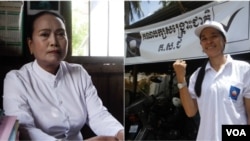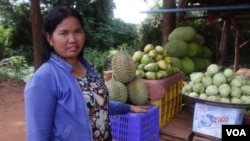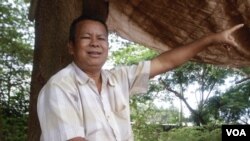As Cambodians go to the polls on Sunday to elect new local council representatives, in a contest dominated by men, two women are facing off for control of this Kampong Speu province commune.
Keo Sophat, 54, the current commune chief and ruling Cambodian People’s Party candidate, is squaring off against Kem Tola, 30, the opposition Cambodia National Rescue Party candidate and a council member since 2012.
In the 2012 election, the CPP won seven of the 11 seats in the area, with the opposition securing the remaining four.
Sophat hopes her record as a councilor will give her the credibility to secure re-election.
“We take good care of people. We solve problems on time. We don’t demand money for administrative costs,” she said, qualifying this by adding that the large commune was difficult to govern.
The CPP won the majority of seats in 2012, securing more than 8,000 of the nearly 11,500 council seats up for grabs. The opposition only won 40 of the 1,633 commune chief positions.
But at the 2013 general election the opposition surprised many by winning a large majority in parliament - 55 of the National Assembly’s 123 seats.
It is thought the ruling party still maintains significant support in the commune, after it gained some 2,000 votes in the 2013 general election. But Tola says the opposition is rising. “Support is increasing,” she said.
“If elected, I will treat people, both rich and poor, equally when they come to ask for basic services,” she added.
But the CNRP won only one commune in Kampong Speu province in 2012 out of a possible 87.
Sophat, however, admits that land conflicts had hurt support for the ruling party. But she maintained that many of the disputes were now resolved amicably and the situation had improved markedly.
Twelve parties will contest the election, but only the CPP and CNRP have registered candidates in the country’s 1,646 communes. The Beehive Social Democratic Party led by Mam Sonando and Khmer National United Party led by Nhek Bun Chhay have also registered candidates in Treng Troyoeng commune.
A fruit seller, Eum Pov, 32, says she will vote against the incumbent. “I want to know if there will be more progress than before or not. I want a change since the current commune chief did not pay attention to people,” she said.
She, like many of her fellow residents, is concerned by a lack of access to basic utilities, such as clean water and electricity. “I want to ask for wells in my village. I need individual wells, or at least one well for two families,” she said.
Pov is also concerned by threats of “war” from Prime Minister Hun Sen should the ruling party lose a general election next year.
“If [the CPP] loses, I am afraid of war. I am worried. The high ranking people don’t want to step down,” she said.
Another villager, Son Phal, 38, said she had spent more than $25 per month buying water as local supply was insufficient. “I’ve had to buy water to use for at least 10 or 20 years already,” she said, adding that Sophat was not telling the truth when she claimed not to charge villagers for administrative services.
Sok Hong, 58, echoed Phal’s remarks. “When there is document that needs to be signed, you need money.”
“They don’t listen to people’s suggestions. For example, when the road is broken, and people requested repairs, they don’t do it. People get angry and don’t want to vote,” he said.










